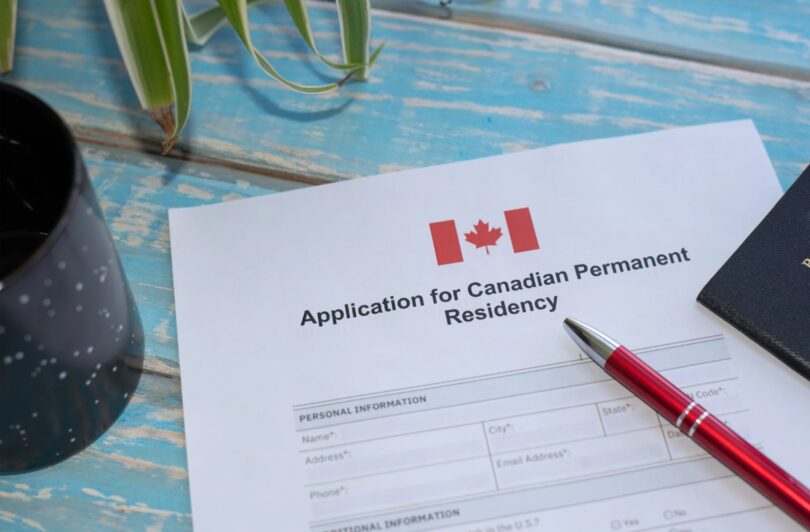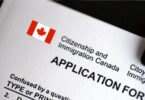Advertisements
Canada is a dream destination for many people seeking to settle in a country with incredible opportunities, a high standard of living, and stunning natural beauty. If you are married to a Canadian citizen or permanent resident, you might be wondering how marriage can help you obtain a visa to live in Canada. Well, you don’t need to worry anymore. Canada has certain immigration measures like the family reunification measure which was set up in May 2023 to help reunite loved ones.
In this article, we will show you five ways through which you can get a Canada visa by marriage.
1. Spousal Sponsorship
One of the most common ways to get a Canada visa through marriage is by being sponsored by your spouse or common-law partner. If your partner is a Canadian citizen or permanent resident, they can be able to sponsor you for permanent residency.
Eligibility Requirements for the Sponsor
-
- Your spouse or partner must be at least 18 years old
- Your spouse should be a Canadian citizen or a Canadian permanent resident who is living in Canada.
- Your spouse must be financially stable. They must also agree to support you financially for a specific period (usually 3 years).
- The sponsor should not be in prison, be bankrupt, be charged with a heavy offence or be under a removal order.
Eligibility Requirements for You (the Applicant)
- You must prove the genuineness of your relationship with your sponsor. This includes providing evidence such as marriage certificates, photos, messages, and joint financial accounts.
How to Apply
- Application Submission: Your spouse must submit a sponsorship application to Immigration, Refugees and Citizenship Canada (IRCC).
- Provide Proof of Relationship: Include all necessary documents to prove that your marriage is genuine.
- Medical and Background Checks: Undergo medical examinations and security checks as required.
- Approval and Residency: Once approved, you will receive permanent residency, which allows you to live, work, and study in Canada.
This Spousal Sponsorship program falls under 2 categories
Inland Sponsorship Option
If you and your spouse are already in Canada, you can apply for inland sponsorship. This option allows you to stay in Canada while your sponsorship application is being processed.
Benefits of Inland Sponsorship
- You can remain with your spouse during the processing period.
- You may be eligible for an open work permit.
Challenges to Keep in Mind
- You must stay in Canada during the entire process unless you get special permission to leave.
- Processing times can be longer compared to outland sponsorship.
Outland Sponsorship Option
Outland sponsorship is suitable if you live outside Canada or need to travel frequently during the application process. Unlike inland sponsorship, you can apply through the visa office in your home country.
Advantages of Outland Sponsorship
- You can live outside Canada while waiting for your application to be approved.
- Processing times may be quicker, depending on the visa office handling your application.
How to Apply
- Submit an application for outland sponsorship with all required documents.
- Wait for processing and approval before moving to Canada.
2. Open Work Permit for Spouses
If you are already in Canada on a temporary visa and your spouse has sponsored you for permanent residency, you can apply for an open work permit. This allows you to work legally while waiting for your application to be processed.
Why This is Important:
- You can earn an income while your application is under review.
- It demonstrates your intention to integrate into Canadian society.
Eligibility Requirements
- You must be a principal applicant who has previously submitted a permanent residence application under the Spouse or Common-Law Partner in Canada Class.
- You are expected to have submitted a work permit application where the duration of the work permit required is for a maximum of two years.
- You must have the same residential address with your sponsor in Canada at the time when you applied
- It is either you have a valid temporary resident status in Canada or you have applied for the restoration of your status.
- Your spouse must have submitted a sponsorship application on your behalf.
- Both you and your spouse (applicant and sponsor) must meet all eligibility requirements under spousal or common-law partner sponsorship.
How to Apply:
- Submit an application for an open work permit alongside your sponsorship application.
- Pay the necessary fees and provide the required documentation.
3. Visitor Visa for Married Applicants
This visitor visa is also known as a Temporary Resident Visa (TRV). It is the type of visa that allows foreigners to come into Canada for various purposes like family visits, vacation or business. If you are not in Canada yet, you can apply for a visitor visa to stay with your spouse while your sponsorship application is being processed.
Key Points to Consider:
- A visitor visa is temporary and does not guarantee permanent residency.
- You must prove to immigration officers that you intend to leave Canada after your visitor visa expires (unless your sponsorship is approved).
- Provide evidence of your genuine relationship to support your case.
Eligibility Requirements:
- The sponsor must show sufficient funds to maintain the family members stay during your stay
- You will be required to show a clean police record and be a police-abiding citizen in your home country
- You should also convince the authority that you will not pose any security risk
- You should also convince the immigration officer that you will not work temporarily or study in Canada during your stay.
- You should show proof of good health.
How to Apply:
- Ensure you are eligible through the above listed requirements
- Fill out the visitor application form and submit alongside the following documents:
- Passport-size photographs
- Proof of marriage
- Proof of funds
- Travel itinerary (if any)
- Any extra document as applies to you or requested by the Canadian visa office.
- Pay the necessary fees required of you
- Submit the completed application and other required documents to the nearest Canadian visa office or application center.
- You will be sent a biometrics instruction letter. Endeavor to book an appointment and give biometrics at a Visa Application centre (VAC).
- If your application is approved, you will receive a visitor visa that allows you to travel to Canada.
4. Express Entry
A Canada visa by marriage through Express Entry involves immigrating to Canada with the sponsorship of your Canadian spouse or partner. Being married to a Canadian citizen or permanent resident can indirectly support your Express Entry application by awarding you additional points if they accompany you to Canada or improving your adaptability score.
Advertisements
Canada’s Express Entry is a points-based immigration system used to manage applications for permanent residency through three programs:
- Federal Skilled Worker Program (FSWP)
- Federal Skilled Trades Program (FSTP)
- Canadian Experience Class (CEC)
Applicants are ranked based on a Comprehensive Ranking System (CRS) score that evaluates factors like age, education, work experience, language proficiency, and adaptability. If you’re applying through Express Entry and your spouse is not sponsoring you directly but is included in your application, their Canadian status or residency can provide additional CRS points.
Eligibility Requirements
-
Meet Program-Specific Requirements:
- FSWP: At least one year of skilled work experience, language proficiency, and sufficient funds.
- FSTP: A valid job offer or certificate of qualification in a skilled trade.
- CEC: At least one year of Canadian work experience within the last three years.
-
CRS Points Boost Through Marriage:
- If your spouse is Canadian, you may gain points under adaptability factors.
- If they’re accompanying you, their skills and qualifications can increase your CRS score.
-
Valid Relationship:
- Must provide proof of a genuine marriage or common-law partnership (e.g., photos, joint accounts, or leases).
-
Applicant Eligibility:
- Medical, criminal background checks, and proof of your relationship’s authenticity.
How to Apply
-
Create an Express Entry Profile:
- Include information about your spouse/partner, even if they are not accompanying you.
-
Boost Your CRS Score:
- Include your spouse’s language test results, educational credentials, or work experience if relevant.
-
Receive an Invitation to Apply (ITA):
- Submit supporting documents (marriage certificate, proof of spouse’s status, etc.) with your permanent residency application.
-
Complete the Process:
- Attend medical and security checks, then wait for a decision.
5. Provincial Nominee Program (PNP)
The Provincial Nominee Program (PNP) is a pathway for immigration to Canada where provinces or territories select individuals to meet their specific economic and labor market needs. If you’re married to or in a relationship with a Canadian citizen or permanent resident living in a specific province, the PNP can indirectly support your application. This happens when your spouse nominates you as part of their provincial sponsorship, provided you meet certain residency and settlement criteria.
Eligibility Requirements
- Provincial Nomination: Each province has specific requirements for applicants nominated under their PNP, often tied to employment or residence in that province.
- Language Proficiency: Proof of language skills in English or French (e.g., IELTS, CELPIP, or TEF).
- Settlement Plan: Demonstrate your intent and ability to reside in the province after becoming a permanent resident.
- Spouse Support: If married to a Canadian citizen or permanent resident:
- You must demonstrate a genuine relationship.
- Your spouse may need to reside in the province you’re applying to.
- Evidence that the sponsor can financially support you.
- Provide documents showing the marriage is genuine and not solely for immigration purposes (e.g., marriage certificate, joint financial records, photos, communication history).
How to Apply
Step 1: Confirm Provincial Requirements
- Research the specific PNP program of the province your spouse resides in. Popular provinces like Ontario, British Columbia, and Alberta may have additional requirements or streams supporting family members.
Step 2: Submit an Expression of Interest (EOI)
- For provinces using an EOI system, your spouse can nominate you as part of their settlement plan. Some provinces allow spouses of permanent residents to apply alongside them.
Step 3: Apply for Family Class Sponsorship
- Submit a Family Class Sponsorship application via the Immigration, Refugees, and Citizenship Canada (IRCC) portal.
- Include all supporting documents proving the legitimacy of your marriage and financial sponsorship.
Step 4: Apply for Permanent Residence
- Once your PNP nomination and sponsorship are approved, apply for permanent residence under the Provincial Nominee stream.
- Ensure all medical, criminal, and settlement documentation is provided.
Step 5: Finalize Settlement in the Province
- Upon receiving your visa, settle in the nominating province to fulfill the PNP obligations. This will also strengthen your case for permanent residency.
Frequently Asked Questions
What documents do I need for a spousal sponsorship application?
- Marriage certificate
- Photographs of your relationship
- Proof of communication (emails, texts, call logs)
- Joint financial statements (if applicable)
- Proof of cohabitation (if living together)
Can my spouse sponsor me if they are not financially stable?
No, your spouse must demonstrate financial stability to sponsor you. However, exceptions may apply in certain cases, such as disability benefits.
How long does the spousal sponsorship process take?
Processing times vary, but it usually takes 12 to 24 months. Inland sponsorship may take longer than outland sponsorship.
Can I work in Canada while waiting for my sponsorship application?
Yes, you can apply for an open work permit if you are in Canada and have applied through inland sponsorship.
Is a common-law partner eligible for sponsorship?
Yes, common-law partners who have lived together for at least one year can be sponsored, provided they meet the eligibility criteria.
What happens if my sponsorship application is denied?
If your application is denied, you can appeal the decision or reapply after addressing the reasons for the denial.
Do I need to pass a language test for spousal sponsorship?
No, there is no language test requirement for spousal sponsorship applications.
Can I include my children in the application?
Yes, dependent children can be included in your sponsorship application. Additional documents may be required for them.
Conclusion
Getting a Canada visa by marriage is a journey that requires careful planning, patience, and documentation. First understand your options and then choose the path that best suits your situation. Remember, proving the genuineness of your relationship is the main part for a successful application.
We hope this guide has answered your questions and given you a clear guidance to getting your Canada visa through marriage.
Good luck on your journey to building a life in Canada!
Advertisements






